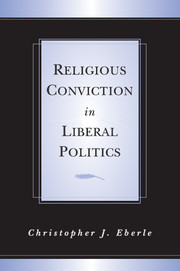Concluding Comments
Published online by Cambridge University Press: 18 December 2009
Summary
The doctrine of restraint is deeply at odds with the norms I think we should associate with the social role of citizen in a liberal democracy. We legitimately expect liberal citizens to decide on and advocate support for their favored political commitments on the basis of their convictions of conscience: we should expect our compatriots to support only those coercive laws that they take to be morally appropriate. We legitimately expect liberal citizens to arrive at their convictions of conscience conscientiously: otherwise the appeal to conscience can degenerate into intransigent sectarianism. We legitimately expect liberal citizens to be open to the possibility that their moral convictions are false and so to be willing to learn from their compatriots. We legitimately expect liberal citizens to do what is within their power to justify to their compatriots the claim that some coercive law they conscientiously support is morally appropriate. But at some point, each citizen has to resolve what to do: she has to decide which policies merit her support. At that point, at the moment of decision, we should expect citizens to make their respective resolutions on the basis of convictions of conscience – on the basis of what they take to be the relevant moral considerations, whatever those moral considerations happen to be. And we should reject the doctrine of restraint because it is inconsistent with that desideratum: a citizen might lack a public justification for the policies she conscientiously regards as morally appropriate and in that case the doctrine of restraint obliges her to withhold her support from those policies.
- Type
- Chapter
- Information
- Religious Conviction in Liberal Politics , pp. 331 - 333Publisher: Cambridge University PressPrint publication year: 2002



